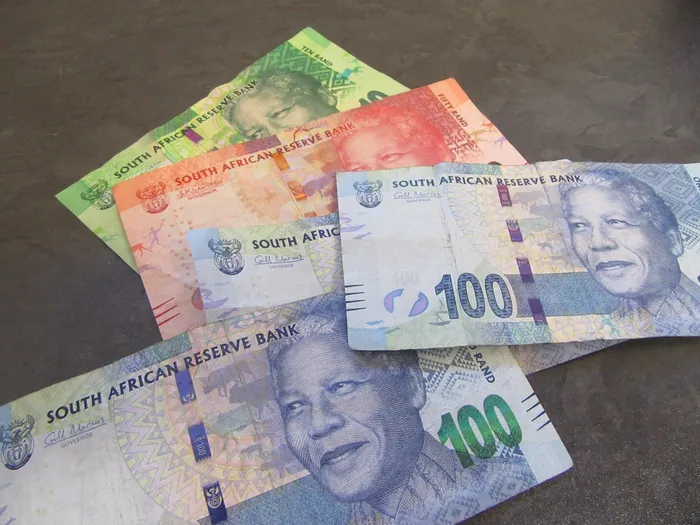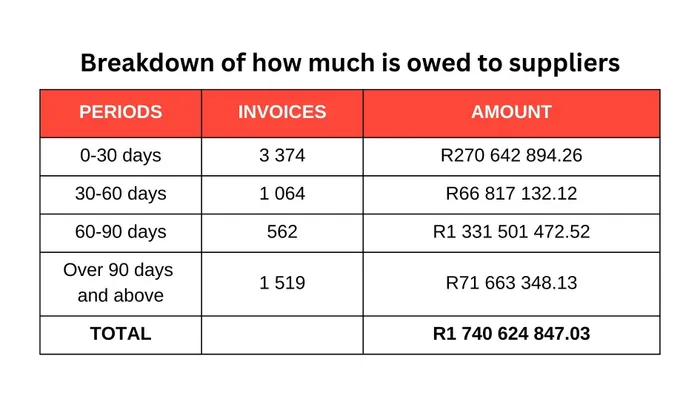KZN health department owes suppliers over R1.7bn, raising concerns for small businesses

The KwaZulu-Natal Department of Health faces significant scrutiny due to a substantial R1.7 billion debt owed to suppliers.
Image: File
The KwaZulu-Natal Department of Health is embroiled in controversy for owing suppliers a staggering R1.7 billion - a situation that is reportedly affecting service delivery in the province.
In a written response to a question by the DA’s Tim Brauteseth regarding outstanding payments, KZN Health MEC Nomagugu Simelane disclosed that the department’s total debts to suppliers stand at R1 740 624 847.03.

A table illustrating amounts owned by the KwaZulu-Natal Department of Health to suppliers.
Image: Thobeka Ngema
“The department endeavours to pay all suppliers and service providers within 30 days; however, the cash flow challenges that are facing the KZN Department of Health hinders that,” Simelane said and that the amount will be settled during the first quarter of the next financial year.
Simelane added that an amount of R1.7 billion will form part of accruals. These payments could not be paid in the previous financial year because of the department’s financial challenges.
DA KZN spokesperson on health, Dr Imran Keeka, said the party is concerned that KZN businesses are owed an estimated R1.7 billion by the provincial Department of Health (DoH).
Keeka said the reply also indicates that of this, R1.33 billion falls within the 60 to 90-day payment period. Meanwhile, there are 1 519 unpaid invoices in the over 90-day period, amounting to just over R71 million.
He said it is understandable that these precise figures would have undoubtedly fluctuated, given that such finances always remain fluid.
During portfolio committee meetings, Simelane consistently and openly discussed her department’s financial difficulties, according to Keeka’s observation.
“However, such a situation – the non-payment of suppliers on time - should not have arisen in the first place or to the point where they are affecting services,” Keeka said.
“The concern arising out of the parliamentary reply is that it’s very possible that small and medium-sized companies in KZN are worst affected. Equally concerning is that the MEC and acting HOD intimated, during the same meetings, that some service providers, while paid, had not paid their staff. This had led to protest action in some instances implicating the DoH. However, what happens within companies once the DoH has concluded its business with them is beyond its control.”
Keeka said the party notes the department has adopted a ‘take from Peter to pay Paul’ approach to resolve some of the payment issues. This seems to have left some companies struggling more than others. Again, it particularly affects small businesses. Regrettably, this resulted in several suppliers gathering at the department’s Pietermaritzburg head office on Monday, demanding payment.
“The response from MEC Simelane confirms that the outstanding amounts due to suppliers will be paid during the first quarter of the new financial year, which began on April 1,” Keeka said.
He said the Division of Revenue Bill or the budget, as presented by Finance Minister Enoch Godongwana on March 12, has been withdrawn, with provinces set to table their budgets within two weeks of May 21. Once KZN’s budget is tabled and certainty exists, it is expected that the situation may turn around.
Meanwhile, the Public Servants Association (PSA) has condemned the staggering revelations.
PSA KZN manager Mlungisi Ndlovu said the negligent and unsustainable pattern of delayed payments is an indictment of the department’s leadership and failure to implement responsible fiscal oversight.
“Suppliers, many of whom are critical to delivering essential medical goods and services, are being financially suffocated. This threatens the stability of the provincial health system and the lives of patients who rely on effective healthcare,” Ndlovu said.
“The PSA considers it unacceptable that financial mismanagement of this magnitude continues unabated, with no meaningful consequences for the decision-makers responsible. The department’s failure to honour its financial commitments violates basic principles of good governance and erodes public confidence in the healthcare system.”
thobeka.ngema@inl.co.za